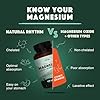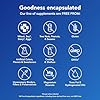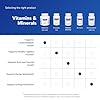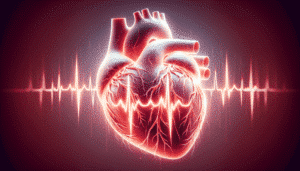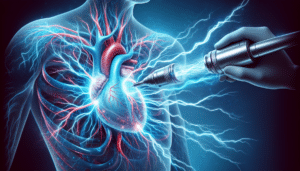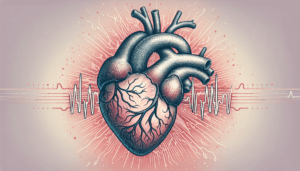When heart palpitations strike, finding ways to calm your heartbeat is a priority. Among potential solutions, specific vitamins or supplements have emerged as allies in this quest. In this article, we focus on what vitamins stop heart palpitations, how they work, and safe ways to add them to your diet. Get ready to uncover the essential nutrients that might help bring your heart rhythm back to a steady pace.
Key Takeaways
- Correcting vitamin deficiencies such as magnesium, potassium, omega-3 fatty acids, and vitamin D has the potential to reduce heart palpitations and support heart health.
- Including magnesium-rich and potassium-rich foods in one’s diet can help prevent heart palpitations and maintain cardiovascular wellness.
- Consultation with healthcare professionals is crucial before taking supplements to ensure they are beneficial and do not interfere with heart health or existing conditions or medications.
Vital Vitamins to Halt Heart Palpitations

Heart palpitations can feel like a drummer who’s lost the beat, causing discomfort and concern. While vitamin supplements alone may not completely eradicate these sensations, correcting deficiencies and understanding the heart-health benefits of certain vitamins can make a significant difference.
Limited research does suggest that these nutrients play a role in maintaining a normal heart rhythm, hinting at the potential to stop palpitations or at least reduce their frequency.
The Role of Magnesium in Heart Health
Magnesium is a fundamental mineral that plays a pivotal role in numerous physiological processes, including cardiac function. It serves as a critical cofactor for enzymes involved in myocardial contraction and relaxation, thereby ensuring the proper functioning of the heart’s electrical conduction system. Deficiencies in magnesium have been linked to a heightened risk of cardiac arrhythmias, as this mineral is essential for maintaining the stability of the heart’s rhythm.
The importance of magnesium in cardiac health cannot be overstated. It aids in the regulation of heart rhythm by influencing the transport of other electrolytes, such as potassium and calcium, into and out of heart cells. These electrolytes are crucial for producing and conducting the electrical impulses that govern the heart’s rhythmic contractions. By modulating these processes, magnesium acts as a natural calcium channel blocker, which is a class of medications often prescribed to treat various forms of arrhythmias.
For individuals experiencing heart palpitations, which are often a symptom of arrhythmias, magnesium supplementation may offer therapeutic benefits. It is imperative, however, that such supplementation is undertaken with the guidance of healthcare professionals, as they can provide personalized advice based on individual health status and needs. By carefully managing magnesium intake, patients may find an improvement in the frequency and severity of heart palpitations, thereby enhancing their overall cardiovascular health and wellbeing.
The Role of Potassium in Heartbeat Regulation
Potassium, an essential mineral, is critical for maintaining a healthy heart rhythm. It functions much like a conductor, ensuring that the electrical signals within the heart are transmitted smoothly, which in turn regulates the heartbeat. When potassium levels are within the optimal range, the heart beats in a steady and controlled manner.
However, a deficiency in potassium, known as hypokalemia, can disrupt this delicate balance. Low potassium levels can lead to a variety of cardiac issues, including heart palpitations, where the heart beats irregularly or skips beats. This can be particularly concerning as it may increase the risk of serious arrhythmias, which are disorders of the heart rate or rhythm.
Symptoms of potassium deficiency may include fatigue, muscle cramps, and irregular heartbeats. If these occur, it is important to consult a healthcare professional promptly. They can provide a proper diagnosis and determine if the palpitations are indeed related to potassium levels or if another underlying issue may be the cause.
To prevent potassium deficiency and its associated heart palpitations, incorporating potassium-rich foods into your diet is recommended. Foods such as bananas, oranges, spinach, and sweet potatoes are excellent sources of potassium. For individuals who struggle to get enough potassium from their diet alone, a healthcare provider may recommend potassium supplements.
When it comes to supplementation, it’s essential to adhere to the recommended dosage, as too much potassium can lead to hyperkalemia, a condition that is just as dangerous as its deficiency counterpart. Hyperkalemia can cause muscle weakness, numbness, and potentially life-threatening heart rhythm disturbances.
The decision to use potassium supplements should always be made in consultation with a healthcare provider, who can advise on the correct dose and monitor potassium levels to ensure they remain within a safe range. This is especially important for individuals with kidney problems or those taking medications that affect potassium levels, such as certain diuretics.
In conclusion, potassium plays a vital role in regulating heartbeat and preventing heart palpitations. A balanced intake through diet, and when necessary, supplementation under medical supervision, can help maintain this essential mineral’s levels for optimal heart health.
Omega-3 Fatty Acids: Not Always The Heart’s Ally
While omega-3 fatty acids are lauded for their heart-healthy effects, they must be consumed with a note of caution, particularly for individuals with specific types of arrhythmias. These fatty acids, commonly found in fatty fish, are like the violins in our symphony—essential for the melody but requiring the right touch to avoid overwhelming the piece.
Epidemiological studies have suggested that moderate consumption of omega-3 fatty acids, particularly from dietary sources like fish, may have a protective effect against the development of atrial fibrillation. However, the evidence is not entirely consistent. Some clinical trials have shown that high doses of fish oil supplements, particularly doses over 1 gram a day, which provide a concentrated intake of omega-3s, may be associated with an increased risk of AFib, particularly in patients with high cardiovascular risk or existing heart conditions.
For instance, a large study known as the VITAL Rhythm Trial investigated the effects of vitamin D and omega-3 supplements on the risk of developing atrial fibrillation. The findings indicated that while omega-3 supplements did not significantly increase the overall risk of AFib, there was a numerically higher incidence of AFib in the omega-3 group compared to the placebo group, suggesting a potential association at high doses.
The current understanding is that while omega-3 fatty acids are beneficial for many aspects of heart health, there may be a threshold above which the risk of AFib increases. The American Heart Association recommends eating two servings of fatty fish per week, which provides a natural source of omega-3s without the risks associated with high-dose supplements.
It is essential for individuals considering omega-3 supplements, particularly in large doses, to consult with healthcare providers. This is especially important for those with a history of heart disease or arrhythmias, as personalized advice can help navigate the potential benefits and risks associated with omega-3 fatty acid intake.
Vitamin D’s Influence on Cardiac Function
Vitamin D, renowned not only for its crucial role in bone health but also for its significance in cardiac function, is a determinant of heart rhythm stability. Insufficient levels of vitamin D can disrupt the heart’s electrical activity, akin to a pianist who falters and strikes dissonant chords. By facilitating proper calcium metabolism in the body, vitamin D supports the electrical conduction system of the heart, ensuring that each beat follows the next in a precise and orderly sequence. Supplementation with vitamin D, when indicated, can aid in the correction of arrhythmias and assist in the regulation of blood pressure, contributing to the overall cardiovascular health.
However, it is imperative to maintain a balanced approach to vitamin D intake, as excessive consumption can lead to toxicity, which may have the opposite effect and destabilize heart rhythms, emphasizing the need for balance and medical oversight in the management of vitamin D levels.
Nutrient-Rich Diet for Cardiovascular Wellness

A heart-healthy diet is like a well-composed symphony, with each nutrient playing its part to create a harmonious balance. Ensuring an adequate intake of essential nutrients through a balanced diet can support optimal heart function and minimize the risk of heart palpitations.
A diet rich in fruits, vegetables, and whole grains, complemented by controlled portion sizes, lays the foundation for preventing cardiovascular disease and promoting cardiovascular wellness.
Magnesium-Rich Foods for a Strong Heart
To fortify the heart’s rhythm, including magnesium-rich foods like:
- green leafy vegetables
- legumes
- nuts
- seeds
- whole grains
is like adding a strong bass line to music—it provides depth and stability. These magnesium powerhouses, especially foods like spinach, pumpkin seeds, and chia seeds, are instrumental in preventing heart palpitations and supporting overall heart health.
The Power of Potassium in Regulating Heart Rhythm

Potassium is to the heart what rhythm is to music—it keeps the beat steady and consistent. A diet rich in high-potassium foods such as:
- potatoes
- tomatoes
- avocados
- bananas
Electrical impulses in the heart muscle can help regulate both normal heart rhythm and prevent abnormal heart rhythms.
Low potassium levels can disrupt this rhythm, leading to irregular heartbeats and palpitations, highlighting the importance of this essential mineral in maintaining heart function.
Managing Mineral Supplements and Electrolyte Balance
In the quest for a steady heartbeat, managing mineral supplements and electrolyte balance is as crucial as tuning instruments before a concert. Before embarking on any supplementation regimen, it’s imperative to consult a healthcare professional to tailor the approach based on individual health conditions.
Excessive supplementation can be counterproductive, and a personalized plan is key to navigating the delicate balance of minerals necessary for heart health.
The Risks of Too Much Magnesium
Just as an overpowering solo can disrupt an orchestral piece, too much magnesium can lead to adverse effects, particularly for those with kidney damage. When the kidneys cannot eliminate excess magnesium effectively, it can result in:
- Muscle weakness
- Nausea and vomiting
- Diarrhea
- Irregular heartbeat
- Low blood pressure
- Difficulty breathing
- Confusion and drowsiness
It is important to consult with a healthcare professional before taking magnesium supplements, especially if you have kidney problems.
This highlights the importance of moderation and the need for medical guidance when considering magnesium supplements.
Balancing Electrolytes for a Steady Beat
Maintaining electrolyte balance for a steady heartbeat is akin to achieving the perfect pitch in music. Genetic predispositions can influence one’s susceptibility to heart palpitations, just as genetics can affect a musician’s ear for tone.
Understanding one’s unique vitamin needs, potentially through genetic testing, can aid in managing heart palpitations and maintaining a healthy heart rhythm.
Lifestyle Factors Affecting Heart Palpitations

The tempo of life, with its stresses and anxieties, can often mimic the unpredictable rhythms of jazz, sometimes leading to rapid heartbeats and palpitations. Emotional factors and anxiety can act as triggers, underscoring the importance of managing mental health to support heart function.
Lifestyle modifications, such as reducing caffeine intake and employing stress reduction techniques, play a role in preventing or reducing the frequency of heart palpitations.
Stress and Anxiety: Triggers for Rapid Heartbeat
Anxiety disorders can set the heart racing, much like a fast-tempo song can accelerate the pulse. Managing stress through lifestyle changes can help alleviate these occasional heart palpitations caused by anxiety.
Techniques such as psychotherapy, medication, and complementary approaches like yoga and exercise, can mitigate the frequency of heart palpitations caused by strong emotions and anxiety.
The Impact of Blood Pressure on Heart Rhythm
Just as a maestro controls the dynamics of a performance, maintaining healthy blood pressure is key to controlling the rhythm of the heart. A balanced diet with adequate potassium and magnesium, along with limiting salt intake, can help maintain healthy blood pressure levels and prevent high blood pressure. This, in turn, may reduce the risk of heart palpitations, ensuring the steady flow of the heart’s rhythm, much like the flow of a river guided by its banks.
Addressing Underlying Medical Conditions and Medication Interactions
The interplay between underlying conditions, medication interactions, and heart palpitations is as complex as a multi-movement symphony, with each element influencing the outcome. Congestive heart failure, for instance, can lead to palpitations as the heart struggles to pump blood effectively.
Addressing these underlying conditions through a combination of lifestyle changes, medications, and possibly surgical interventions can improve heart function and reduce the occurrence of palpitations.
Congestive Heart Failure and Irregular Heartbeats
Congestive heart failure is like an orchestra playing out of sync, with the heart’s inability to pump effectively leading to irregular heartbeats. Underlying damage to the heart, such as from past heart attacks or heart disease, can exacerbate this condition.
The inefficient pumping action of the heart, trying to compensate for reduced blood circulation, may trigger palpitations, akin to an ensemble straining to maintain the tempo.
Diuretic medications, commonly used for congestive heart failure, can contribute to electrolyte imbalance and increase risk for palpitations.
Prescription Medications: Weighing Benefits and Risks
Prescription medications can have side effects that resemble the surprise chords in a musical piece, including heart palpitations. Medications for conditions like congestive heart failure, asthma, infections, and thyroid disorders may contribute to heart palpitations.
It is important to discuss these potential side effects with a healthcare provider, who can help weigh the benefits and risks of each treatment option.
Navigating Supplements and Cardiovascular Diseases

Navigating the world of supplements and cardiovascular diseases can be as delicate as a violinist choosing the right string to pluck. Consulting with a healthcare provider before starting supplements for heart palpitations ensures that the choice supports heart health without interfering with existing conditions or treatments.
Excessive intake of certain vitamins can have adverse effects, underscoring the importance of careful consultation and adherence to recommended daily allowances.
Treating Arrhythmia with Dietary Supplements
Dietary supplements, like traditional Chinese herbs and CoQ10, offer a complementary melody to the treatment of arrhythmias. While some supplements, such as Wenxin Keli, have shown significant effects, others, like bitter orange and ginseng, must be approached with caution to avoid triggering rapid or irregular heartbeats.
Coenzyme Q10, with its role in cellular growth and antioxidant properties, may protect against heart failure and could be beneficial in managing arrhythmias.
Cardiovascular Diseases and Nutritional Support
Vitamins B6 and B2 play critical roles in cardiovascular health, akin to the foundational notes that support a musical composition. By lowering homocysteine levels and LDL cholesterol, vitamin B6 contributes to heart health, while vitamin B2 reduces oxidative stress, a factor in the development of cardiovascular diseases.
These nutrients underscore the importance of a holistic approach to cardiovascular care, blending traditional medical treatments with nutritional support.
Summary
As the curtain draws on our exploration of the heart’s symphony, we are reminded of the critical role that vitamins, minerals, and lifestyle choices play in maintaining its steady rhythm. Like the instruments in an orchestra, each nutrient and habit contributes to the overall performance of our cardiovascular health. We’ve learned how magnesium, omega-3 fatty acids, and vitamin D can support a normal heart rhythm, and how dietary choices and electrolyte balance are essential to the heart’s steady beat.
Let this serve as a catalyst for you to manage your cardiac health with diligence, informed by a thorough understanding of its complexities. Recognize that optimal health is achieved when all physiological functions operate in concert, with the heart’s rhythm being critical among them. By treating your heart with the care and consideration it merits, you ensure its enduring function and vitality.
Frequently Asked Questions
What vitamin deficiency causes irregular heartbeat?
Low vitamin D levels can lead to irregular heartbeat due to their influence on calcium levels. This deficiency can cause atrial fibrillation, increasing the risk of stroke and heart failure.
What can I take naturally for heart palpitations?
You can try relaxation techniques, vagal maneuvers, staying hydrated, and consuming electrolytes to naturally alleviate heart palpitations. These methods can help regulate your heartbeat without the need for medication or medical intervention.
Are there any risks associated with taking magnesium supplements for heart health?
Yes, excessive magnesium supplementation can have adverse health effects, especially for individuals with kidney damage. It’s crucial to consult a healthcare provider before starting any new supplement regimen.
How can omega-3 fatty acids affect heart rhythm?
Omega-3 fatty acids can be beneficial for heart health and may reduce the risk of arrhythmias, but they should be used with caution in cases of atrial fibrillation. Research has shown that high doses can increase risk for AFib.
What lifestyle changes can help reduce heart palpitations?
To reduce heart palpitations, focus on managing stress, reducing caffeine intake, and maintaining healthy blood pressure levels through a balanced diet and exercise. These lifestyle changes can contribute to reducing the frequency of heart palpitations.
The Best Atrial Fibrillation Book
Your Complete Guide To AFib: The Essential Manual For Every Patient With Atrial Fibrillation
(as of March 4, 2026 15:01 GMT -06:00 - More infoProduct prices and availability are accurate as of the date/time indicated and are subject to change. Any price and availability information displayed on [relevant Amazon Site(s), as applicable] at the time of purchase will apply to the purchase of this product.) The A to Z guide on everything you need to know about atrial fibrillation. Written by AFib expert Dr. Percy Morales MD. Over 120 pages of essential information on medications, procedures, and lifestyles modifications for AFib. Easy to read for every patient.
Shop AFib Products on Amazon
KardiaMobile 6L EKG Monitor, Medical-Grade, FDA-Cleared Heart Monitor, 6 Views of The Heart, Results in 30 Seconds, Unlimited Recordings, Works with Smartphones, HSA&FSA Eligible, Pocket-Size
(as of March 4, 2026 20:50 GMT -06:00 - More infoProduct prices and availability are accurate as of the date/time indicated and are subject to change. Any price and availability information displayed on [relevant Amazon Site(s), as applicable] at the time of purchase will apply to the purchase of this product.)
KardiaMobile 1-Lead EKG Monitor, Medical-Grade FDA-Cleared Personal Heart Monitor, Detects Normal, AFib & Arrhythmias, Unlimited Recordings, 30 Second Results, Works with most Smartphones, Pocket-size
(as of March 4, 2026 20:50 GMT -06:00 - More infoProduct prices and availability are accurate as of the date/time indicated and are subject to change. Any price and availability information displayed on [relevant Amazon Site(s), as applicable] at the time of purchase will apply to the purchase of this product.)
Apple Watch Series 9 [GPS 41mm] Smartwatch with Storm Blue Aluminum Case with Silver Sport Band M/L. Fitness Tracker, Blood Oxygen & ECG Apps, Always-On Retina Display
(as of March 4, 2026 21:06 GMT -06:00 - More infoProduct prices and availability are accurate as of the date/time indicated and are subject to change. Any price and availability information displayed on [relevant Amazon Site(s), as applicable] at the time of purchase will apply to the purchase of this product.)
Fitbit Sense 2 Advanced Health and Fitness Smartwatch with Tools to Manage Stress and Sleep, ECG App, SpO2, 24/7 Heart Rate and GPS, Shadow Grey/Graphite, One Size (S & L Bands Included)
(as of March 4, 2026 23:42 GMT -06:00 - More infoProduct prices and availability are accurate as of the date/time indicated and are subject to change. Any price and availability information displayed on [relevant Amazon Site(s), as applicable] at the time of purchase will apply to the purchase of this product.)
OMRON Complete 2-in-1 Blood Pressure Monitor + EKG for Home Use & Upper Arm Blood Pressure Cuff - #1 Doctor & Pharmacist Recommended Brand - Clinically Validated - Connect App
(as of March 4, 2026 15:43 GMT -06:00 - More infoProduct prices and availability are accurate as of the date/time indicated and are subject to change. Any price and availability information displayed on [relevant Amazon Site(s), as applicable] at the time of purchase will apply to the purchase of this product.)
Samsung Galaxy Watch 6 44mm Bluetooth Smartwatch, Fitness Tracker, Personalized HR Zones, Advanced Sleep Coaching, Heart Monitor, BIA Sensor, Health Wellness Insights, Big Screen, US Version, Graphite
(as of March 4, 2026 15:43 GMT -06:00 - More infoProduct prices and availability are accurate as of the date/time indicated and are subject to change. Any price and availability information displayed on [relevant Amazon Site(s), as applicable] at the time of purchase will apply to the purchase of this product.)
Natural Rhythm Triple Calm Magnesium Complex - 120 Capsules, Chelated Magnesium Glycinate, Taurate & Malate, High Absorption Supplement for Sleep, Stress, Muscle & Heart Support, Non-GMO, Vegan
(as of March 4, 2026 23:42 GMT -06:00 - More infoProduct prices and availability are accurate as of the date/time indicated and are subject to change. Any price and availability information displayed on [relevant Amazon Site(s), as applicable] at the time of purchase will apply to the purchase of this product.)
Pure Encapsulations Magnesium (Glycinate) - Supplement to Support Stress Relief, Sleep, Heart Health, Nerves, Muscles, and Metabolism* - with Magnesium Glycinate - 180 Capsules
(as of March 4, 2026 21:07 GMT -06:00 - More infoProduct prices and availability are accurate as of the date/time indicated and are subject to change. Any price and availability information displayed on [relevant Amazon Site(s), as applicable] at the time of purchase will apply to the purchase of this product.)









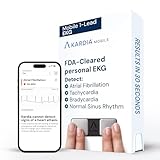






![Apple Watch Series 9 [GPS 41mm] Smartwatch with Storm Blue Aluminum Case with Silver Sport Band M/L. Fitness Tracker, Blood Oxygen & ECG Apps, Always-On Retina Display #1](https://m.media-amazon.com/images/I/311xwtp4mFL._SL100_.jpg)
![Apple Watch Series 9 [GPS 41mm] Smartwatch with Storm Blue Aluminum Case with Silver Sport Band M/L. Fitness Tracker, Blood Oxygen & ECG Apps, Always-On Retina Display #2](https://m.media-amazon.com/images/I/41j+8AaUGsL._SL100_.jpg)
![Apple Watch Series 9 [GPS 41mm] Smartwatch with Storm Blue Aluminum Case with Silver Sport Band M/L. Fitness Tracker, Blood Oxygen & ECG Apps, Always-On Retina Display #3](https://m.media-amazon.com/images/I/41jIyxZitnL._SL100_.jpg)
![Apple Watch Series 9 [GPS 41mm] Smartwatch with Storm Blue Aluminum Case with Silver Sport Band M/L. Fitness Tracker, Blood Oxygen & ECG Apps, Always-On Retina Display #4](https://m.media-amazon.com/images/I/41IpNJERjCL._SL100_.jpg)
![Apple Watch Series 9 [GPS 41mm] Smartwatch with Storm Blue Aluminum Case with Silver Sport Band M/L. Fitness Tracker, Blood Oxygen & ECG Apps, Always-On Retina Display #5](https://m.media-amazon.com/images/I/31o17yhfYpL._SL100_.jpg)

















